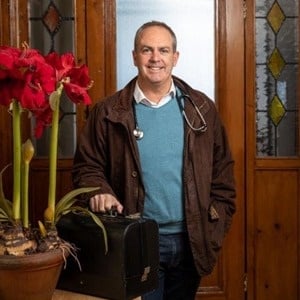
Forget long queues in doctors' waiting rooms. Old-fashioned house-calls are back and becoming increasingly popular around the world – and South Africa is no exception.
Dr Cameron Bruce has pioneered a Cape Town-based company called Chariot Health that is entirely focused on home-based medical care. According to Bruce, home visits are making their way back for very humane reasons:
“People want a choice, and when it comes to medical care, growing numbers of individuals are choosing to be treated in the comfort of their own homes, close to their loved ones,” he says.
Chariot Health was established way back in 2010, with Bruce initially being the only practitioner involved. In 2015, a nurse got on board. Since 2017, the company has seen steady growth and currently has a total of 17 practitioners, including doctors, nurses, physiotherapists and a speech and swallowing therapist.
“Some practitioners are busier than others. We’re growing our footprint between Melkbosstrand and Scarborough, and we now have representation in the City Bowl and some extension into the Northern Suburbs as well,” says Bruce, adding that they’re looking to extend their brand further afield in areas outside Cape Town.
Old-fashioned with a modern twist
Chariot Health is essentially an administrative platform that provides the necessary means for independent practitioners. Home visits are facilitated through their digital platform that allows for communication between a patient and multidisciplinary medical practitioners.
The platform also allows practitioners to share information on the patient, coordinate treatment, and record updates on the patient’s condition.
An additional benefit is that it assists healthcare practitioners involved in a case to provide regular feedback to selected family members, or other loved ones, keeping them informed of developments.
Bruce says this has been especially helpful in families where one sibling is entrusted with parental care while the others are based elsewhere.
Targeted at the frail and elderly
Chariot Health’s services is especially valuable in the case of vulnerable patients or those requiring palliative or geriatic care who can’t easily leave their homes to see a healthcare practitioner.
However, Bruce explains that their practitioners do also see younger, more able-bodied patients who are happy to pay for a home visit, although they do not form the core target market.
Home visit services are available during normal working hours and after hours in the evening during the week. On weekends, there is a telephonic call service attended by a doctor on call.
"We are able to visit after hours at times, although we unfortunately cannot guarantee this. We can, however, ensure telephonic support as a baseline."
Does it cost more than a ‘normal’ consultation?
The callout fee is more than the general consultation fee at a GP’s practice, says Bruce.
“Usually, a GP’s consultation rate is based on a 15-minute consultation. We set aside about an hour in order to do a home visit.
"This will include travel time and a consultation of usually 30 minutes or more, which is why our fees are more than a 'normal' consultation rate.”
It just makes financial sense
Health consultant Johann Serfontein believes that it’s not efficient for GPs to make a living from home visits because medical aid schemes are not willing to pay them enough to do so, but Bruce believes house visits have a place in our country, and strongly supports this call, saying patients should be assisted to live the type of life they want.
“I think Johann Serfontein is right in that this area of work is not being well reimbursed traditionally because it’s being seen possibly as a luxury to have home visits.
“However, importantly, for the right type of patient, medical aids are looking to reimburse better for this sort of work done. I think this is an area of work that’s being looked at, since it does make financial sense to look after a patient at home, rather than have them in hospital.
“So I believe this area of care is going to be a worthwhile area to be involved in, and it should provide a reasonable income for a dedicated practitioner."
Patients should be assisted to live the type of life they want, says Bruce.
"Instead of going to the hospital, they could choose to live and be treated at home and be allowed to make choices between things they still want to do in their lives and where and how they should be treated,” says Dr Bruce.
Image: Supplied




 Publications
Publications
 Partners
Partners










